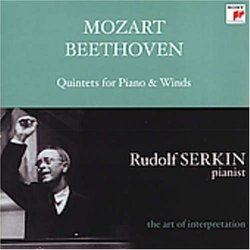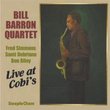| All Artists: Ludwig van Beethoven, Wolfgang Amadeus Mozart, Rudolf Serkin Title: Mozart, Beethoven: Quintets for Piano & Winds Members Wishing: 0 Total Copies: 0 Label: Sony Release Date: 2/22/2005 Album Type: Original recording remastered Genre: Classical Styles: Chamber Music, Historical Periods, Classical (c.1770-1830) Number of Discs: 1 SwapaCD Credits: 1 UPCs: 827969390924, 5099751707325 |
Search - Ludwig van Beethoven, Wolfgang Amadeus Mozart, Rudolf Serkin :: Mozart, Beethoven: Quintets for Piano & Winds
 | Ludwig van Beethoven, Wolfgang Amadeus Mozart, Rudolf Serkin Mozart, Beethoven: Quintets for Piano & Winds Genre: Classical
|
Larger Image |
CD DetailsSimilar CDs
|
CD ReviewsROOTS DAVID BRYSON | Glossop Derbyshire England | 09/08/2005 (5 out of 5 stars) "By the origins of his career, Serkin was a chamber-player who later turned soloist. The principals of the wind sections in the Philadelphia or any other great orchestra normally do a good deal of chamber work over and above their orchestral duties too, so one would expect this particular quintet to be naturals for these particular works. One would be right, and furthermore they were all experienced collaborators from Serkin's concerto recordings. The two pieces are to some extent piano-led, being the work of composers who were themselves outstanding pianists, but Mozart's was a ground-breaking effort in giving near-equality with the piano to the wind parts, and the youthful Beethoven follows his example faithfully.
The performances date from 1953 when Serkin was 50 and at the height of his powers. I have not seen them in any catalogues for a long time, so this issue is particularly welcome as part of the Serkin centenary series now gathering pace and momentum from Sony in Europe. Only two years later the very same pieces were recorded by a stellar consort consisting of Dennis Brain and three leading London woodwind-players together with, of all people, Gieseking at the piano. I have lived with their performances on a really excellent References LP for many years now, and it has been a fascinating experience to have this alternative version. The recording on the Serkin disc is not the equal of that given to Gieseking and the rest of them, which was astonishingly good even on vinyl, but it is quite acceptable. Neither any shortcomings it has nor the short measure the disc offers even tempt me to deny a fifth star to a reissue of such significance. I should say that this disc wins hands-down in the Mozart, or at least that it is a very much safer bet as far as the interpretation goes. This is much more my idea of normal Mozart playing. The sense is far more alert and sprightly, whereas there is a curiously trance-like quality to the other, beautiful exceedingly to quote Coleridge, but a very special effect. In the central larghetto Serkin's group are actually significantly slower, but there is more impression of forward movement despite that. In the Beethoven I think the recorded quality gives it to the Gieseking group. It is a most attractive composition in my own opinion, and as usual in even the earliest Beethoven while the influences from Mozart and Haydn are glaringly obvious the work does not sound to me much like Haydn and even less does it really resemble Mozart in idiom, closely modelled though it may be in formal respects. This composer had a distinctive voice of his own from the outset and Mozart is totally inimitable. Once again the Philadelphia group are somewhat livelier, but the difference in this work is nothing approaching what it is in the other. I don't want to labour comparisons much beyond this point - this is a Serkin reissue when all's said and done, and the point of acquiring it is presumably to hear these compositions specifically from Serkin. The main fault of the recording concerns the horn tone, which is nowhere near as faithful or as beautiful as Brain gets. The woodwind come off better and the piano best of all, not a bad reproduction of the genuine Serkin sound by any means. There is a very French liner-note by Andre Tuboeuf, translated into very French English but thoughtful and helpful in its way. The producers of the set seem not to have noticed that Mozart's quintet has a slow introduction to the first movement, and the timings of all 6 movements are given differently in the liner and on the back of the record-box, the box having the right ones. Not to be missed, I'd say. I don't know how long these reissues are going to be on the market and I don't feel like taking chances on that." |

 Track Listings (6) - Disc #1
Track Listings (6) - Disc #1

